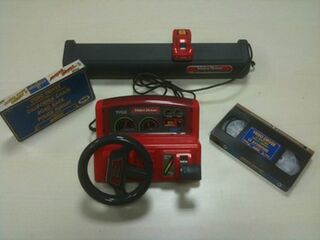Difference between revisions of "Video Driver"
From Sega Retro
(→Hardware: - Corrected misinformation on game releases) |
|||
| Line 25: | Line 25: | ||
The video driver relies on special VHS cassettes, which although are functionally identical to normal cassettes, devote the bottom section of the the picture to flashing white lights. These lights are then picked up by the sensor as "obstacles" - the user having to move the car out of the way to succeed. When turned on, the wheel automatically adds points to a mechanical scoreboard mounted on its front - if the car is positioned in a location recognised as an obstacle, no points are added, the idea being to hit as few obstacles as possible. There are also gears mounted on the unit, which need to be adjusted to match the rate of the flashing lights. | The video driver relies on special VHS cassettes, which although are functionally identical to normal cassettes, devote the bottom section of the the picture to flashing white lights. These lights are then picked up by the sensor as "obstacles" - the user having to move the car out of the way to succeed. When turned on, the wheel automatically adds points to a mechanical scoreboard mounted on its front - if the car is positioned in a location recognised as an obstacle, no points are added, the idea being to hit as few obstacles as possible. There are also gears mounted on the unit, which need to be adjusted to match the rate of the flashing lights. | ||
| − | Only two games were ever released for the Video Driver | + | Only two English language games were ever released for the Video Driver, individually known as ''California Chase'' and ''Road Racer'', which are essentially the same game but with different footage. On cassettes where the two games were bundled together, the latter was renamed to ''Road Race''. A third game, ''Police Pursuit'' is also known to exist, but was never released. The Japanese Family Driver saw three releases called ''Seaside Drive (海辺のドライブ"),'' ''Halahara Touring (ハラハラ ツーリング)'' and ''I am a Patrolman (ぼくはパトロール)''. The Video Driver was largely unpopular with the general public and was discontinued shortly after release. |
==Promotional material== | ==Promotional material== | ||
Revision as of 11:15, 23 September 2024

| |||||||||||||||||||||||||
| Video Driver | |||||||||||||||||||||||||
|---|---|---|---|---|---|---|---|---|---|---|---|---|---|---|---|---|---|---|---|---|---|---|---|---|---|
| Manufacturer: Sega | |||||||||||||||||||||||||
| Distributor: Tyco (US), Action GT (UK), Gig Electronics (IT) | |||||||||||||||||||||||||
|
This short article is in need of work. You can help Sega Retro by adding to it.
The Video Driver, known as the Family Driver (ファミリードライバー) in Japan, is an obscure dedicated video game system designed by Sega.
It was released in the late 1980s in Japan, before being brought to North America as well as parts of Europe. Manufacturing of the product and North American distribution was handled by Tyco, with Action GT distributing the product in the United Kingdom and Gig in Italy. It is a VHS-driven device with games similar in nature to full motion video releases of the early 1990s.
Hardware
The video driver is a battery-powered plastic steering wheel attached to a bulky sensor. The sensor is meant to then be physcially attached to a television, though it only fits comfortably on 13-20-inch 4:3 screens found in the late 80s. It sits in front of the television, "looking" at the screen. Mounted on top of the sensor is a small plastic car, which can be moved left or right across the top of the unit by steering the wheel.
The video driver relies on special VHS cassettes, which although are functionally identical to normal cassettes, devote the bottom section of the the picture to flashing white lights. These lights are then picked up by the sensor as "obstacles" - the user having to move the car out of the way to succeed. When turned on, the wheel automatically adds points to a mechanical scoreboard mounted on its front - if the car is positioned in a location recognised as an obstacle, no points are added, the idea being to hit as few obstacles as possible. There are also gears mounted on the unit, which need to be adjusted to match the rate of the flashing lights.
Only two English language games were ever released for the Video Driver, individually known as California Chase and Road Racer, which are essentially the same game but with different footage. On cassettes where the two games were bundled together, the latter was renamed to Road Race. A third game, Police Pursuit is also known to exist, but was never released. The Japanese Family Driver saw three releases called Seaside Drive (海辺のドライブ"), Halahara Touring (ハラハラ ツーリング) and I am a Patrolman (ぼくはパトロール). The Video Driver was largely unpopular with the general public and was discontinued shortly after release.
Promotional material
JP TV advert (15 seconds)
JP TV advert (30 seconds)
Physical scans
Software
| Video Driver, US (California Chase) |
|---|
|
| Video Driver, UK (Police Pursuit) |
|---|
|
| Video Driver, JP (Boku wa Patrol (ぼくはパトロール)) |
|---|
|









